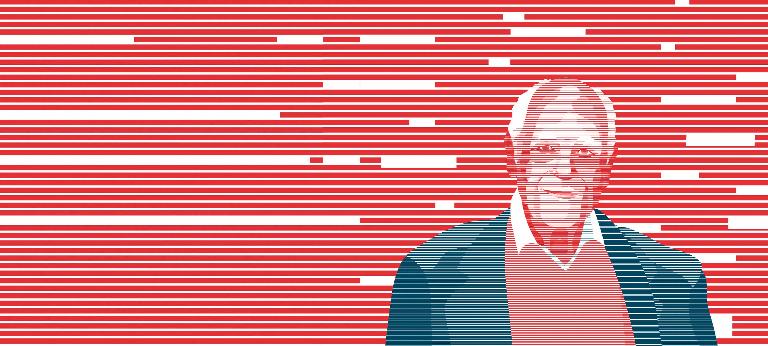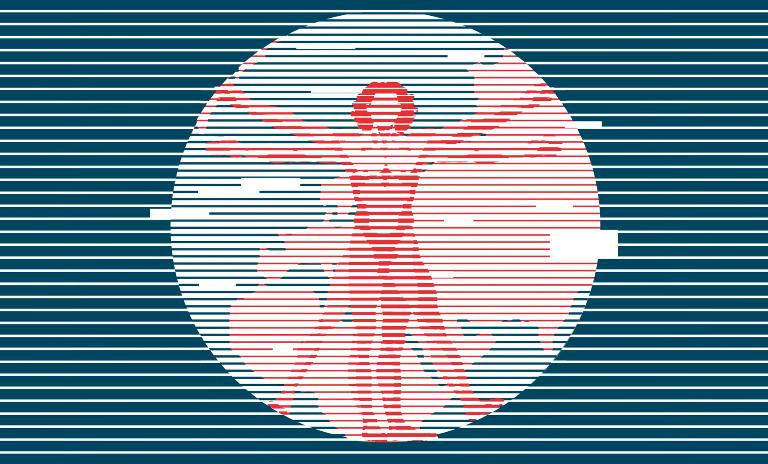The purpose principle
![{[downloads[language].preview]}](https://www.rolandberger.com/publications/publication_image/think_act_magazine_purpose_the_purpose_principle_cover_1_download_preview.png)
What does purpose mean to you and your business? Our Think:Act magazine on purpose addresses changing values in the business world.


by Neelima Mahajan
illustrations by Borge B. Bredenbekk
The online version of the interview reproduces the entire length of the conversation.
Read more about the topic
"The purpose principle – missions give businesses strength"
Visionary thinker Charles Handy shares his thoughts for the future of business based on eight decades of experience and explains how we need to reinvent capitalism.
If ideas are the currency of the future, Charles Handy should be a gazillionaire. For the last 40 years the self-styled social philosopher has had a knack for coining concepts ahead of their time. His groundbreaking observations include the rise of outsourcing, the “portfolio career” and the “shamrock organization” – which uses the leaves of the Celtic symbol to represent the three kinds of workers: employees, contractors and temporary workers.
He’s a prolific writer too, blasting into the management firmament in 1976 with “Understanding Organizations” and since then writing more than 20 books, including “The Elephant and the Flea”, “Gods of Management” and “The Age of Unreason”.
Now in his 80s, his grandfather-like demeanor is at odds with the fact that he’s showing no signs of slowing down. His most recent book, “The Second Curve” tackles nothing less than how to reinvent society, and in this interview he shares some fresh observations about today’s organizations. As he talks he smiles at the one thread that binds all his work together: the important role that human beings play in business. “Organizations are full of human beings," he says, "and I get worried when we forget that, when we call them human resources. What worries me at the moment is that we are trying to replace human beings with digital technology because it's cheaper." It’s a good start to what becomes a freewheeling conversation with Think:Act.

Are businesses prepared for the brave new world of automation and technological advances?
I don't think they are. Some are, of course – the new fashionistas from Silicon Valley, the Ubers and so on, which are effectively platform organizations. They don't have customers, they have users. I think organizations are beginning to think, "Why don't we think of our employees, not as human resources, but as users of our platform, and we facilitate them to do their work?" Now, how many organizations are thinking like that? Very few. But I think more and more will do that, because they'll begin to see the idea that you own these workers, as if they were your family, and you tell them what to do, is not going to work with the new kind of people that are coming up. You have to give them the opportunity to be creative, and to do their best on your behalf, but also for themselves. Thinking of them as users of your platform is another way of doing it. You should not be surprised to find these big organizations suddenly becoming lots of little projects, connected through this platform: they tell the platform what they're doing and ask the platform for the resources they need.
"Making shareholders rich is not really a motivating purpose. Making society rich is better."
Speaking of the platform model, is it necessarily a good thing?
I think it is, because it allows individuals to motivate themselves, and to create their own work themselves, instead of being told what to do. Okay, organizations said we already allow our people to think creatively. But it's about going further than that. They are responsible for creating their own work and finding their own customers.
This self-responsibility also comes with a cost. A lot of the privileges and benefits that come with traditional employment are being thrown out of the window in this new model. So it comes at a cost to the employee…
I don't think they think that. The new young people don't want all that. I think things like pensions would go. They will have to arrange their own pensions, which the organization will offer the facilities for but leave it up to them. So we're handing a lot of responsibility back to the individual, but within the sort of big overall umbrella of the organization, facilitated by digital technology. But I hope, we don't replace too many people with digital technology. It's going to be tempting, because an awful lot of the work that can be done in organizations, could be done more cheaply with digital technology, but digital technology cannot offer compassion, empathy, hope, dreams, visions. So we need the human beings, that's humanity.
You talk about the idea of the do-it-yourself economy and self-responsibility. How prepared are we to take charge?
Not at all. Young people, the best of them, are more prepared. They do not want to join big organizations, unless they go to platforms. But we need to change our education and encourage people to think for themselves. Schools should provide learning opportunities for people to practice what life's going to be like, which is forming groups, creating their own opportunities.
What about organizations? What should their responsibilities be?
The main responsibility is to contribute to the society in which they operate. I'm really worried about where the money is going to come from, to support the welfare states we have. More and more people will be independent in this gig economy. They will be busy, but they won't be rich, so they won't be paying many taxes. So the money has to come from the corporation. In the past the corporation provided this money, through the salaries of workers, who then pay tax… If they can't have a lot of people paying taxes, they've got to find another way of supporting society. If the society goes down, they go down. They've got to see themselves as partners in society, not as some independent activity, that occasionally pays rent in society… They've got to be much more involved.
The business of business has got to be society. That might make them much more “human” places. People want a purpose in life. Making shareholders rich is not a really motivating purpose. Making a society rich is better.
You talk of a very interesting concept in your new book, that of the citizen organization. What kind of mental shift do organizations and employees today have to go through to realize that vision of the citizen organization?
It's just an idea. If we treat people as a citizen, then they have certain rights and responsibilities. Their rights are to help in taking big decisions Their responsibility is to them, as a citizen, to contribute in some ways, both to the organization, but also to the society around the organization. And I think again, it makes them feel, not just like a tool, but a responsible person.… If you're a citizen of a country, your responsibility is in a sense, to behave as people would want the citizen of that country to behave. To keep the law, to contribute, to behave properly… You're not just a tool, you are rather important. Citizenship is something that we prize, in any country, and we should say the same for organizations. So you don't become a citizen of a company unless you've been there for three years or something like that. Probably, as you became a citizen of Britain, you have to pass a little exam and you have to swear that you'll obey the laws and then... there's a ceremony. I think we could do the same.
In today's organizations, particularly when we are talking of millennials, they tend to be less loyal. They change jobs pretty frequently, so how do we really go about building the kind of cohesion a citizen organization needs?
Well, they will say, we don't feel any loyalty to the organization, as the organization doesn't offer us any loyalty.
Exactly.
The organization says, no they just switch around, somebody's got to start the bargain, and I think it's the organization that has to say, if you become a citizen, we give you certain privileges, but that doesn't mean you can't go off be a citizen somewhere else. We've got to recreate that kind of bond. And I think it's the organization that's got to do it first.
Now this idea of the citizen organization also calls for participation from the employees in key decisions. With so many voices involved how does one maintain efficiency without risking this participation and slowing things down?
It's rather like the works councils they have in Germany. I was talking to somebody who just recently started as a manager working for a German company and he said: "I have to appear before the workers council every year to explain, give account of myself, explain what I'm doing, and they question me.” It's a ritual, but it's an important ritual and so they're not taking decisions for him. They might agree to his decisions, but they are questioning him and he says: "I feel accountable to them, I have to justify my actions to them." I think it's that kind of two-way accountability that one is looking for rather than participation in the actual decisions, which of course they're not equipped to do. That's what the manager is paid to do: to make those big decisions, but he has to explain them to people.
You've long been a critic of the idea of shareholder value and why it's given undue importance. Within the citizen organization, what happens to this notion? Because it seems like it's something that the shareholders would oppose.
They have no right to oppose. Shareholders own shares, they don't own the company in any sensible way. They can elect the directors, but they cannot tell the director what to do. They cannot even ask to see the long-term plan, they have no control over directors at all... If they don't like what we're doing, they can sell their shares…
And how should the role of leaders change for this new world?
Well, it only changes dramatically if you're a good leader. If you're a good leader, your job is to provide some kind of vision of where we're going and what the purpose of our work is and to be otherwise there to encourage and persuade. Your job as leader is not to tell people what to do, it's to tell them where you hope we're going, to encourage them and maybe to organize them in some sort of ways that helps them to do their job better. Though I would say that's more a management job than a leadership job. I mean good leaders are hardly visible really because everybody knows what they are about and what they think and so on. I talked to the CEO of a really big multinational company, and I said, "Tell me what do you do?" And he said, "I'm a missionary, I go around all the bits and branches of my organization telling them what it's all about. And converting them to my view of what it's all about."
So it's evangelism of some kind?
Right.
In today's environment, do we need to change the lens with which we view progress and growth?
We need to have a much wider focus of what progress is. I don't think growing bigger is necessary if you want progress around what an organization is. Growing better might be more interesting… Doing work that you're proud of is terribly important. I think the most motivating thing for someone here, is to be able to point at something and say, "I did that. I built that cathedral." You can't always point to a physical object these days, but you can take some pride. And of course if you can put your name on it in some way because your group did it, just as when at the end of a television program you see all the people, you could put their name on it, that's good. So pride is very important.
You once said in an interview that organizations that see themselves as seed beds of future independent business people will do themselves a huge favor. To what extent do you see organizations do that?
Oh, I think it's important that they don't have to keep people with them for the whole of their lives. You're going to live until you're 95 at least, and organizations, if you belong to one, will not be able to support you financially for all that time, but at least they could equip you to earn your own living during that time. So I like to see organizations as, often in some ways as a sort of venture capitalist, investing in your skills and your education and development, even if you do it outside the organization, because then the organization has a bunch of alumni who are in a sense its ambassadors, and they can be very valuable to them. I think organizations are in a way a school for life. Okay, you go to school, but then I think the real school is your first organization, and I think they should think of themselves like that.
In the 1970s and 1980s, you told us what the future looked like and we can see that now. What can you tell us about the next 50 years?
The author of some 20 books spanning four decades and the initiator of the Sloan Program at London Business School, Charles Handy received the Thinkers50 Lifetime Achievement Award in 2011.
It's going to be difficult. We've got to keep control of the digital world, not let it run away with us. One of the duties of an organization is to somehow give money to its people so that they can actually buy products from other organizations or from ourselves. When Henry Ford was criticized for paying over the rate for his workers, he said, "But who else is going to buy our cars if we don't give them the money?". One of the mechanisms of organizations has always been to pay into the economy in some ways. Now we've got to find a way of doing that, which still allows them to be competitive with organizations, which are largely digital, which is much cheaper. I don't honestly know how we're going to solve that problem. You have an organization like Danone, which employs I believe 480,000 people around the world. That's pushing out a lot of money, consumer buying power. If we reduce that to 100,500, or something which we could do with digital technology perhaps, that's impoverishing the society. So yes, Danone makes more money, but society loses. Now this is a big dilemma. Danone then gives a huge chunk of its profits back to society, which distributes it in welfare payments or something, or it continues to employ those people in some way.
In some way we've got to begin to redefine the purpose of a company so that it's not just making money for itself, but it's actually creating a life for its people. But I don't see any models yet of that. We've got to change the capitalist idea so that it's more human-based and less money-based.


![{[downloads[language].preview]}](https://www.rolandberger.com/publications/publication_image/think_act_magazine_purpose_the_purpose_principle_cover_1_download_preview.png)
What does purpose mean to you and your business? Our Think:Act magazine on purpose addresses changing values in the business world.
Curious about the contents of our newest Think:Act magazine? Receive your very own copy by signing up now! Subscribe here to receive our Think:Act magazine and the latest news from Roland Berger.
